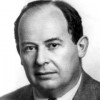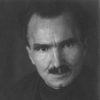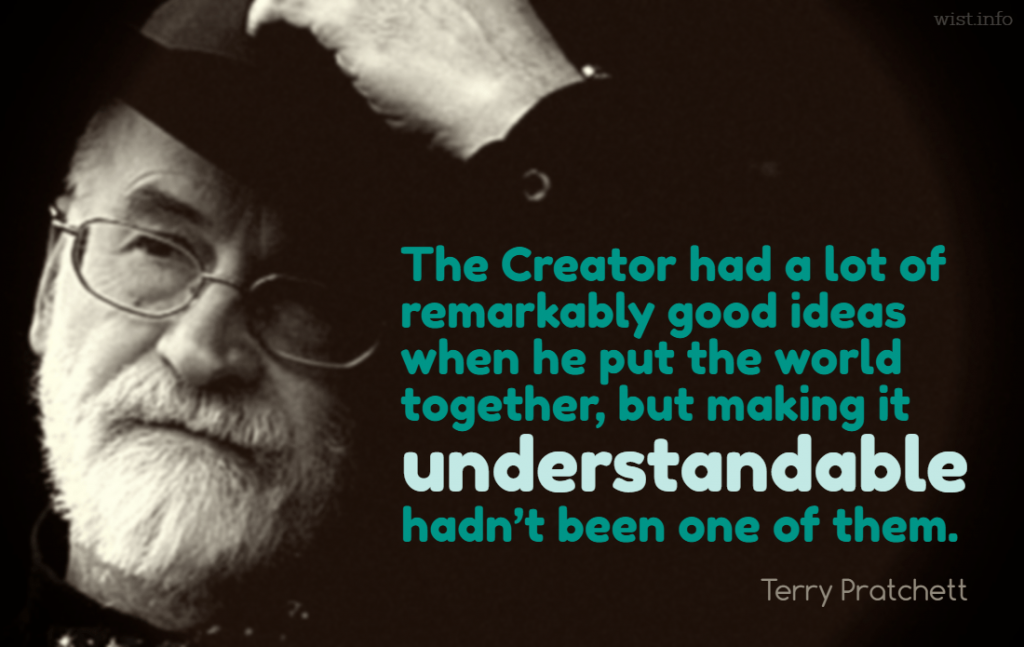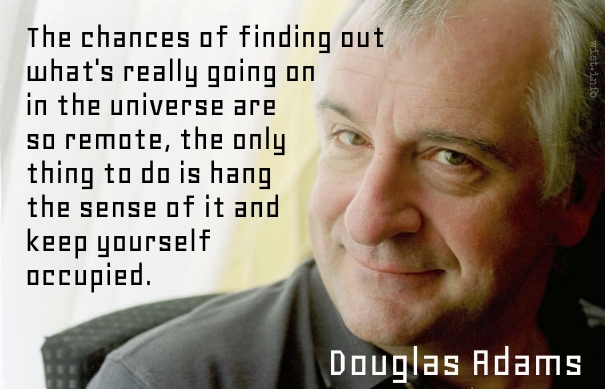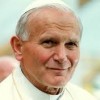When I come to my own beliefs, I find myself quite unable to discern any purpose in the universe, and still more unable to wish to discern one. Those who imagine that the course of cosmic evolution is slowly leading up to some consummation pleasing to the Creator, are logically committed (though they usually fail to realize this) to the view that the Creator is not omnipotent or, if He were omnipotent, He could decree the end without troubling about means.
Bertrand Russell (1872-1970) English mathematician and philosopher
“Is There a God?” (1952)
(Source)
Essay commissioned by Illustrated magazine in 1952, but never published there. First publication in Russell, Last Philosophical Testament, 1943-68 (1997) [ed. Slater/Köllner].
Quotations about:
universe
Note not all quotations have been tagged, so Search may find additional quotes on this topic.
The glory of the One Who moves all things
shines through the universe and is reflected
by all things in proportion to their merit.[La gloria di colui che tutto move
per l’universo penetra, e risplende
in una parte più e meno altrove.]Dante Alighieri (1265-1321) Italian poet
The Divine Comedy [Divina Commedia], Book 3 “Paradiso,” Canto 1, l. 1ff (1.1-3) (1320) [tr. Musa (1984)
(Source)
God as the "unmoved mover" derives from Aristotle (Metaphysics 12.7), frequently referenced in medieval Scholastic writings.
Musa provides this variant translation as "a more interpretive rendering" in his notes (and a rendering similar to Ciardi's). His more literal translation, which he uses in the main text, is given below.
(Source (Italian)). Alternate translations:
His Glory, who, with solitary hand,
Launches thro' boundless space the stellar Band,
And shines effulgent, or involves his Throne
In darkness, as he wills ....
[tr. Boyd (1802), st. 1]
His glory, by whose might all things are mov’d,
Pierces the universe, and in one part
Sheds more resplendence, elsewhere less.
[tr. Cary (1814)]
The glory of Him who moveth all things
Pierceth the universe, and shines so fair,
More at one part, and less, perchance, elsewhere.
[tr. Bannerman (1850)]
The glory of Him who moveth everything
Doth penetrate the universe, and shine
In one part more and in another less.
[tr. Longfellow (1867)]
The glory of Him who moves all things penetrates through the universe, and shines forth in one quarter more, and less in another.
[tr. Butler (1885)]
His glory who moves all doth penetrate
Throughout the universe, and shineth bright
Here with a greater, there with lesser state.
[tr. Minchin (1885)]
The glory of Him who moves everything penetrates through the universe, and shines in one part more and in another less.
[tr. Norton (1892)]
The All-mover's glory penetrates through the universe, and regloweth in one region more, and less in another.
[tr. Wicksteed (1899)]
The glory of Him who moves all things penetrates the universe and shines in one part more and in another less.
[tr. Sinclair (1939)]
The glory of Him who moveth all that is
Pervades the universe, and glows more bright
In the one region, and in another less.
[tr. Binyon (1943)]
The glory of Him who moves all things soe’er
Impenetrates the universe, and bright
The splendour burns, more here and lesser there.
[tr. Sayers/Reynolds (1962)]
The glory of Him who moves all things rays forth
through all the universe, and is reflected
from each thing in proportion to its worth.
[tr. Ciardi (1970)]
The glory of the All-Mover penetrates through the universe and reglows in one part more, and in another less.
[tr. Singleton (1975)]
The glory of him who moves everything
Penetrates the universe and shines
In one part more and, in another, less.
[tr. Sisson (1981)]
the glory of the One who moves all things
permeates the universe and glows
in one part more and in another less.
[tr. Mandelbaum (1984)]
The glory of the One Who moves all things
penetrates all the universe and shines
in one part more and in another less.
[tr. Musa (1984)]
The glory of Him who moves all things
penetrates through the universe and shines
forth in one place more and less elsewhere
[tr. Durling (2011)]
The glory of Him, who moves all things, penetrates the universe, and glows in one region more, in another less.
[tr. Kline (2002)]
Glory, from Him who moves all things that are,
penetrates the universe and then shines back,
reflected more in one part, less elsewhere.
[tr. Kirkpatrick (2007)]
The glory of Him who moves all things
pervades the universe and shines
in one part more and in another less.
[tr. Hollander/Hollander (2007)]
The Glory of He who made and moves it all
Penetrates the entire universe
Glowing in one part more, in another less.
[tr. Raffel (2010)]
The glory of the Animator of Everything
Pervades the universe and shines more
In one area and less somewhere else.
[tr. Bang (2021)]
You could say to the universe this is not fair. And the universe would say: Oh, isn’t it? Sorry.
To me the honour is sufficient of belonging to the universe — such a great universe, and so grand a scheme of things. Not even Death can rob me of that honour. For nothing can alter the fact that I have lived; I have been I, if for ever so short a time. And when I am dead, the matter which composes my body is indestructible — and eternal, so that come what may to my “Soul,” my dust will always be going on, each separate atom of me playing its separate part — I shall still have some sort of a finger in the pie. When I am dead, you can boil me, burn me, drown me, scatter me — but you cannot destroy me: my little atoms would merely deride such heavy vengeance. Death can do no more than kill you.
W. N. P. Barbellion (1889-1919) English diarist [William Nero Pilate Barbellion, pen name of Bruce Frederick Cummings]
The Journal of a Disappointed Man, 1912-12-22 (1919)
(Source)
Somewhere, something incredible is waiting to be known.
Carl Sagan (1934-1996) American scientist and writer
(Spurious)
The words come from a profile of Sagan, "Seeking Other Worlds," Newsweek (15 Aug 1977). The final paragraph reads:
“A serious search with negative results says something of profound importance,” Sagan argues. “We discover there’s something almost forbidden about life ... if it turns out we really are alone.” But clearly, Sagan is looking for a happier result. There may be no galumphing green Barsoomian giants to satisfy the fantasies of a romantic Brooklyn boy. But no doubt, there are even stranger discoveries to be made ... some totally new phenomenon perhaps ... Somewhere, something incredible is waiting to be known.
Those final words, not a quotation, have been broadly mistaken for an actual statement by Sagan.
Sharon Begley, one of the writers of the article, has confirmed the words are hers.
Sagan's daughter , Sasha Sagan, has also disavowed the quotation, noting that her father would never have used "incredible" in such a context, as the word literally means "not credible."
More discussion: Somewhere, Something Incredible Is Waiting To Be Known – Quote Investigator®.
An awareness of our smallness may help to redeem us from the arrogance which is the besetting sin of the scientists.
Freeman Dyson (1923-2020) English-American theoretical physicist, mathematician, futurist
Infinite in All Directions, Part 1, ch. 1 “In Praise of Diversity” (1988)
(Source)
Based on a lecture on "Science and Religion," National Conference of Catholic Bishops, Detroit (Sep 1986).
The things which we understand least are the quasars, but I don’t want to get into a technical discussion. But these are the most violent and most energetic objects in the universe, and they’re totally, still totally, mysterious, really. I mean, we know that they’re there, that’s all, and they’re not only there, they’re rather frequent; and nobody ever dreamed that they existed, until they were found. And even after they were found it took a long time before people took them seriously. Nature’s imagination is always richer than ours.
Freeman Dyson (1923-2020) English-American theoretical physicist, mathematician, futurist
“Freeman Dyson: In Praise of Diversity,” Interview on A Glorious Accident, VPRO (Netherlands) (30 Aug 2016)
(Source)
There is an enormous variety of things we’ve discovered that we never dreamed of, like, for example, black holes, pulsars, quasars, all these unbelievably active goings-on in the universe. Which in Aristotle’s time the universe, the sky, was supposed to be quiescent, it was supposed to be perfect and peaceful, and nothing ever happened in the celestial sphere; and that remained true, actually, throughout all of the revolutions. It remained the general view of astronomers right through Copernicus, and Galileo, and Newton, and everybody else, still, the universe looked very quiescent — until just the last thirty years, and now we know it’s not like that at all. In fact the universe is full of violent events, and fantastic, strong gravitational fields, and collapsed objects, and huge outpourings of energy. All these things were discovered in the last thirty years.
Freeman Dyson (1923-2020) English-American theoretical physicist, mathematician, futurist
“Freeman Dyson: In Praise of Diversity,” Interview on A Glorious Accident, VPRO (Netherlands) (30 Aug 2016)
(Source)
Without music there can be no perfect knowledge, for there is nothing without it. For even the universe itself is said to have been put together with a certain harmony of sounds, and the very heavens revolve under the guidance of harmony.
[Itaque sine Musica nulla disciplina potest esse perfecta, nihil enim sine illa. Nam et ipse mundus quadam harmonia sonorum fertur esse conpositus, et coelum ipsud sub harmoniae modulatione revolvi.]
Isidore of Seville (c. 560 - 636) Spanish scholar and cleric [Isidore the Younger, Isidorus Hispalensis]
Etymologiae, Book 3, ch. 17 “On the Power of Music,” § 1 [tr. Brehaut (1912)]
(Source)
To suppose that God Almighty has confined his goodness to this world, to the exclusion of all others, is much similar to the idle fancies of some individuals in this world, that they, and those of their communion or faith, are the favorites of heaven exclusively; but these are narrow and bigoted conceptions, which are degrading to a rational nature, and utterly unworthy of God, of whom we should form the most exalted ideas.
Ethan Allen (1738-1789) American businessman, land speculator, revolutionary, writer
Reason, the Only Oracle of Man, ch. 2 sec. 7 (1782)
(Source)
Life can be confusing. Good God, and how. Sometimes it seems like the older I get, the more confused I become. That seems ass-backwards. I thought I was supposed to be getting wiser. Instead, I just keep getting hit over the head with my relative insignificance in the greater scheme of the universe. Confusing, life.
But it beats the hell out of the alternative.
It’s that moment, that brief epiphany when the universe opens up and shows us something, and in that instant we get just a sense of an order greater than Heaven and, as yet at least, beyond the grasp of Stephen Hawking. It doesn’t require worship, but, I think, rewards intelligence, observation and enquiring minds. I don’t think I’ve found God, but I may have seen where gods come from.
Terry Pratchett (1948-2015) English author
“I create gods all the time — now I think one might exist,” Daily Mail (21 Jun 2008)
(Source)
There probably is a God. Many things are easier to explain if there is than if there isn’t.
John von Neumann (1903-1957) Hungarian-American mathematician, physicist, inventor, polymath [János "Johann" Lajos Neumann]
(Attributed)
(Source)
As quoted in Norman Macrae, John Von Neumann: The Scientific Genius Who Pioneered the Modern Computer, Game Theory, Nuclear Deterrence and Much More (1992).
“So, Jeeves!”
“Yes, sir.”
“What do you mean. Yes, sir?”
“I was endeavouring to convey my appreciation of the fact that your position is in many respects somewhat difficult, sir. But I wonder if I might call your attention to an observation of the Emperor Marcus Aurelius. He said: ‘Does aught befall you? It is good. It is part of the destiny of the Universe ordained for you from the beginning. All that befalls you is part of the great web.'”
I breathed a bit stertorously.
“He said that, did he?”
“Yes, sir.”
“Well, you can tell him from me he’s an ass.”
P. G. Wodehouse (1881-1975) Anglo-American humorist, playwright and lyricist [Pelham Grenville Wodehouse]
The Mating Season, ch. 4 (1949)
(Source)
Adapted from Marcus Aurelius, Meditations, Book 4, #26 [tr. Rendall (1901)].
Wodehouse uses in "Ordeal by Golf" (1919) a similar sentiment from Meditations, Book 10, #5, to suggest Marcus Aurelius was a golfer.
Imitate the spirit of Marcus Aurelius. "Whatever may befall thee," says that great man in his "Meditations," "it was preordained for thee from everlasting. Nothing happens to anybody which he is not fitted by nature to bear." I like to think that this noble thought came to him after he had sliced a couple of new balls into the woods, and that he jotted it down on the back of his score-card.
“All right,” said Susan. “I’m not stupid. You’re saying humans need … fantasies to make life bearable.”
REALLY? AS IF IT WAS SOME KIND OF PINK PILL? NO. HUMANS NEED FANTASY TO BE HUMAN. TO BE THE PLACE WHERE THE FALLING ANGEL MEETS THE RISING APE.
“Tooth fairies? Hogfathers? Little –”
YES. AS PRACTICE. YOU HAVE TO START OUT LEARNING TO BELIEVE THE LITTLE LIES.
“So we can believe the big ones?”
YES. JUSTICE. MERCY. DUTY. THAT SORT OF THING.
“They’re not the same at all!”
YOU THINK SO? THEN TAKE THE UNIVERSE AND GRIND IT DOWN TO THE FINEST POWDER AND SIEVE IT THROUGH THE FINEST SIEVE AND THEN SHOW ME ONE ATOM OF JUSTICE, ONE MOLECULE OF MERCY. AND YET — Death waved a hand. AND YET YOU ACT AS IF THERE IS SOME IDEAL ORDER IN THE WORLD, AS IF THERE IS SOME … SOME RIGHTNESS IN THE UNIVERSE BY WHICH IT MAY BE JUDGED.
“Yes, but people have got to believe that, or what’s the point –”
MY POINT EXACTLY.
It would be a pretty good bet that the gods of a world like this probably do not play chess and indeed this is the case. In fact no gods anywhere play chess. They haven’t got the imagination. Gods prefer simple, vicious games, where you Do Not Achieve Transcendence but Go Straight To Oblivion; a key to the understanding of all religion is that a god’s idea of amusement is Snakes and Ladders with greased rungs.
I am a weak, ephemeral creature made of mud and dream. But I feel all the powers of the universe whirling within me.
Nikos Kazantzakis (1883-1957) Greek writer and philosopher
The Saviors of God [Salvatores Dei], “The Preparation: Second Duty,” #22 (1923) [tr. Friar [1960])
(Source)
Against all appearances the nature of things works for truth and right forever.
Ralph Waldo Emerson (1803-1882) American essayist, lecturer, poet
“Worship,” The Conduct of Life, ch. 6 (1860)
(Source)
The Creator had a lot of remarkably good ideas when he put the world together, but making it understandable hadn’t been one of them.
In short, Mort was one of those people who are more dangerous than a bag full of rattlesnakes. He was determined to discover the underlying logic behind the universe. Which was going to be hard, because there wasn’t one.
It is known that there are an infinite number of worlds, simply because there is an infinite amount of space for them to be in. However, not every one of them is inhabited. Therefore, there must be a finite number of inhabited worlds. Any finite number divided by infinity is as near to nothing as makes no odds, so the average population of all the planets in the Universe can be said to be zero. From this it follows that the population of the whole Universe is also zero, and that any people you may meet from time to time are merely the products of a deranged imagination.
“So the moon effects magic, why?”
“I’m working on several theories,” I said. “But I’m currently favoring the hypothesis that the moon has a seemingly arbitrary effect on magic because it likes to piss me off.”
“That’s a theory with a high degree of applicability to other spheres of life,” he said.
“Yes, it is,” I said, and we spontaneously fist bumped.
So the universe is not quite as you thought it was. You’d better rearrange your beliefs, then. Because you certainly can’t rearrange the universe.
Isaac Asimov (1920-1992) Russian-American author, polymath, biochemist
Nightfall (1990) [with Robert Silverberg]
(Source)
Since geometry is co-eternal with the divine mind before the birth of things, God himself served as his own model in creating the world (for what is there in God which is not God?), and he with his own image reached down to humanity.
“But do you really mean, sir,” said Peter, “that there could be other worlds — all over the place, just round the corner — like that?”
“Nothing is more probable,” said the Professor, taking off his spectacles and beginning to polish them, while he muttered to himself, “I wonder what they do teach them at these schools.”
We need something larger than ourselves — that’s a real religious activity. That’s what space travel can be — relating ourselves to the universe.
There must be either a predestined Necessity and inviolable plan, or a gracious Providence, or a chaos without design or director. If then there be an inevitable Necessity, why kick against the pricks? If a Providence that is ready to be gracious, render thyself worthy of divine succour. But if a chaos without guide, congratulate thyself that amid such a surging sea thou hast a guiding Reason.
[Ἤτοι ἀνάγκη εἱμαρμένης καὶ ἀπαράβατος τάξις ἢ πρόνοια ἱλάσιμος ἢ φυρμὸς εἰκαιότητος ἀπροστάτητος. εἰ μὲν οὖν ἀπαράβατος ἀνάγκη, τί ἀντιτείνεις; εἰ δὲ πρόνοια ἐπιδεχομένη τὸ ἱλάσκεσθαι, ἄξιον σαυτὸν ποίησον τῆς ἐκ τοῦ θείου βοηθείας. εἰ δὲ φυρμὸς ἀνηγεμόνευτος, ἀσμένιζε ὅτι ἐν τοιούτῳ κλύδωνι αὐτὸς ἔχεις ἐν σαυτῷ τινα νοῦν ἡγεμονικόν.]
Marcus Aurelius (AD 121-180) Roman emperor (161-180), Stoic philosopher
Meditations, Book 12, #14 [tr. Haines (1916)]
(Source)
Original Greek. Alternate translations:
Either fate, (and that either an absolute necessity, and unavoidable decree; or a placable and flexible Providence) or all is a mere casual confusion, void of all order and government. If an absolute and unavoidable necessity, why doest thou resist? If a placable and exorable Providence, make thyself worthy of the divine help and assistance. If all be a mere confusion without any moderator, or governor, then hast thou reason to congratulate thyself; that in such a general flood of confusion thou thyself hast obtained a reasonable faculty, whereby thou mayest govern thine own life and actions.
[tr. Casaubon (1634), #11]
Either the Order of Things are fixed by irrevocable Fate, or Providence may be worked into Compassion, or else the World Floats at Raondom without any Steerage. Now if nature lies under immovable Necessity, to what purpose should you struggle against it? If the favor of Providence is to be gained, qualify your self for the Divine Assistance: But if Chance, and Confusion carry it, and no body sits at the Helm; be you contented and Ride out the Storm patiently, for you have a Governor within you , though the World has none.
[tr. Collier (1701)]
Either there is a fatal necessity and invincible order, or a kind providence, or a confusion without a purpose and without a director. If then there is an invincible necessity, why dost thou resist? But if there is a providence which allows itself to be propitiated, make thyself worthy of the help of the divinity. But if there is a confusion without a governor, be content that in such a tempest thou hast in thyself a certain ruling intelligence.
[tr. Long (1862)]
Either the order of things is fixed by irrevocable fate, or providence may be worked into compassion, or else the world floats at random without any steerage. Now if nature lies under an immovable necessity, to what purpose should you struggle against it? If the favor of providence is to be gained, qualify yourself for divine assistance; but if chance and confusion prevail, be you contented that in such a storm you have a governing intelligence within you.
[tr. Zimmern (1887)]
Either the Necessity of destiny and an order none may transgress, or Providence that hears intercession, or an ungoverned welter without a purpose. If then a Necessity which none may transgress, why do you resist? If a Providence admitting intercession, make yourself worthy of assistance from the Godhead. If an undirected welter, be glad that in so great a flood of waves you have yourself within you a directing mind.
[tr. Farquharson (1944)]
Fatal necessity, and inescapable order. Or benevolent Providence. Or confusion -- random and undirected. If it's an inescapable necessity, why resist it? If it's Providence, admits of being worshipped, then try to be worthy of God's aid. If it's confusion and anarchy, then be grateful that on this raging sea you have a mind to guide you.
[tr. Hays (2003)]
Either predetermined necessity and unalterable cosmic order, or a gracious providence, or a chaotic ungoverned mixture. If a predetermined necessity, why do you resist? If it is a gracious Providence that can hear our prayers, then make yourself worthy of divine assistance. If a chaotic ungoverned mixture, be satisfied that in the midst of this storm, you have within yourself a mind whose nature it is to govern and command.
[tr. Needleman/Piazza (2008)]
Cosmogony and cosmology have always aroused great interest among peoples and religions. The Bible itself speaks to us of the origin of the universe and its make-up, not in order to provide us with a scientific treatise, but in order to state the correct relationships of man with God and with the universe. Sacred Scripture wishes simply to declare that the world was created by God, and in order to teach this truth it expresses itself in the terms of the cosmology in use at the time of the writer. The Sacred Book likewise wishes to tell men that the world was not created as the seat of the gods, as was taught by other cosmogonies and cosmologies, but was rather created for the service of man and the glory of God. Any other teaching about the origin and make-up of the universe is alien to the intentions of the Bible, which does not wish to teach how heaven was made but how one goes to heaven.
Pope John Paul II (1920-2005) Polish-born Catholic Pontiff (1978-2005) [b. Karol Józef Wojtyła]
“Cosmology and Fundamental Physics,” Discourse to the Pontifical Academy of Science (3 Oct 1981)
(Source)
NARRATOR: There is a theory which states that if ever anyone discovers exactly what the Universe is for and why it is here, it will instantly disappear and be replaced by something even more bizarrely inexplicable. There is another theory which states that this has already happened.
Douglas Adams (1952-2001) English writer
Hitchhiker’s Guide to the Galaxy, Phase 2, “Fit the 7th” (BBC radio) (1978-12-24)
(Source)
The Narrator then adds:
There is yet a third theory which suggests that both of the first two theories were concocted by a wily editor of The Hitchhiker’s Guide to the Galaxy in order to increase the level of universal uncertainty and paranoia and so boost the sales of the Guide. This last theory is of course the most convincing, because The Hitchhiker’s Guide to the Galaxy is the only book in the whole of the known Universe to have the words DON’T PANIC inscribed in large friendly letters on the cover.
This quotation was brought back to be the epigraph for the second Hitchhiker book, The Restaurant at the End of the Universe (1980), each paragraph on a different page:
There is a theory which states that if ever anyone discovers exactly what the Universe is for and why it is here, it will instantly disappear and be replaced by something even more bizarre and inexplicable.
There is another theory which states that this has already happened.
I cannot imagine a God who rewards and punishes the objects of his creation, whose purposes are modeled after our own — a God, in short, who is but a reflection of human frailty. Neither can I believe that the individual survives the death of his body, although feeble souls harbor such thoughts through fear or ridiculous egotism. It is enough for me to contemplate the mystery of conscious life perpetuating itself through all eternity, to reflect upon the marvelous structure of the universe which we can dimly perceive, and to try humbly to comprehend even an infinitesimal part of the intelligence manifested in nature.
Albert Einstein (1879-1955) German-American physicist
“What I Believe,” Forum and Century (Oct 1930)
(Source)
Einstein crafted and recrafted his credo multiple times in this period, and specifics are often muddled by differing translations and by his reuse of certain phrases in later writing. The Forum and Century entry appears to be the earliest. Some important variants:
I cannot conceive of a God who rewards and punishes his creatures, or has a will of the kind that we experience in ourselves. Neither ca I nor would I want to conceive of an individual that survives his physical death; let feeble souls, from fear or absurd egoism, cherish such thoughts. I am satisfied with they mystery of the eternity of life and with the awareness and a glimpse of the marvelous structure of the existing world, together with the devoted striving to comprehend a portion, be it ever so tiny, of the reason that manifests itself in nature.
— "The World As I See It [Mein Weltbild] [tr. Bargmann (1954)]
I cannot conceive of a God who rewards and punishes his creatures, or has a will of the type of which we are conscious in ourselves. An individual who should survive his physical death is also beyond my comprehension, nor do I wish it otherwise; such notions are for the fears or absurd egoism of feeble souls. Enough for me the mystery of the eternity of life, and the inkling of the marvellous structure of reality, together with the single-hearted endeavor to comprehend a portion, be it never so tiny, of the reason that manifests itself in nature.
— "The World As I See It [Mein Weltbild] [tr. Harris (1934)]
To me it suffices to wonder at these secrets and to attempt humbly to grasp with my mind a mere image of the lofty structure of all there is.
[Es ist mir genug, diese Geheimnisse staunend zu ahnen und zu versuchen, von der erhabenen Struktur des Seienden in Demut ein mattes Abbild geistig zu erfassen.]
— Reduced variant in "My Credo Mein Glaubensbekenntnis]" (Aug 1932)
I’m not an atheist. I don’t think I can call myself a pantheist. The problem involved is too vast for our limited minds. We are in the position of a little child entering a huge library filled with books in many languages. The child knows someone must have written those books. It does not know how. It does not understand the languages in which they are written. The child dimly suspects a mysterious order in the arrangement of the books but doesn’t know what it is. That, it seems to me, is the attitude of even the most intelligent human being toward God. We see the universe marvelously arranged and obeying certain laws but only dimly understand these laws. Our limited minds grasp the mysterious force that moves the constellations.
Albert Einstein (1879-1955) German-American physicist
In G. Viereck, Glimpses of the Great (1930)
(Source)
Note this passage is not present in the Saturday Evening Post interview that was the basis for that chapter of Viereck's book.
It doesn’t seem to me that this fantastically marvelous universe, this tremendous range of time and space and different kinds of animals, and all the different planets, and all these atoms with all their motions, and so on, all this complicated thing can merely be a stage so that God can watch human beings struggle for good and evil — which is the view that religion has. The stage is too big for the drama.
Richard Feynman (1918-1988) American physicist
Viewpoint interview by Bill Stout, KNXT (1 May 1959)
Reprinted in Perfectly Reasonable Deviations from the Beaten Track, ed. by Michelle Feynman, Appendix I (2006).
And people wonder where I get this weird sense of humor; the universe considers me its personal cat toy. You have ANY idea what it’s like to go through life covered in cosmic cat spit?
J. Michael (Joe) Straczynski (b. 1954) American screenwriter, producer, author [a/k/a "JMS"]
irc.warnerbros.com #Babylon5 (23 Jan 1997)
(Source)
If you take the long view, the universe is just something small and round, like those water-filled balls which produce a miniature snowstorm when you shake them.*
* Although, unless the ineffable plan is a lot more ineffable than it’s given credit for, it does not have a giant plastic snowman at the bottom.
Terry Pratchett (1948-2015) English author
Good Omens, 6. “Saturday” (1990) [with Neil Gaiman]
(Source)
I do not know what I may appear to the world; but to myself I seem to have been only like a boy playing on the sea-shore, and diverting myself in now and then finding a smoother pebble or a prettier shell than ordinary, whilst the great ocean of truth lay all undiscovered before me.
My atheism, like that of Spinoza, is true piety towards the Universe and denies only gods fashioned by men in their own image to be servants of their own human interests.










